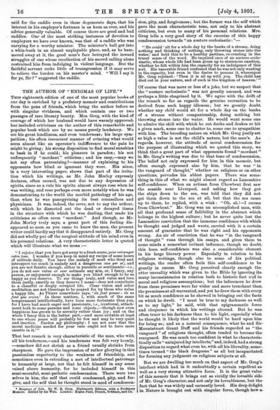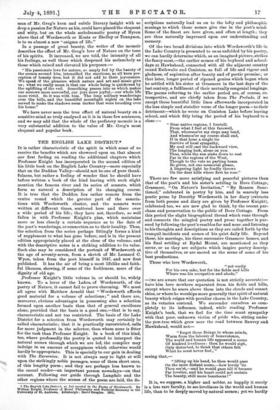THE AUTHOR OF "ENIGMAS OF L.L1 Tam eighteenth edition of
one of the most popular books of our day is enriched by a prefatory memoir and contributions from the pens of friends, which bring the author before us with singular vividness, and which contain one or two passages of rare literary beauty. Mrs. Greg, with the kind of courage of which her husband would have warmly approved, has included criticisms on the author of this remarkable and popular book which are by no means purely laudatory. We see his great kindliness, and even tenderness ; his large wpm-
pathies ; his often insouciant manner of evincing what would seem almost like an operator's indifference to the pain he
might be giving; his strong disposition to find moral sunshine to bask in if he could ; his pleasure in paradox ; his not nnfrequently " mordant" criticism ; and his easy,—may we not say often patronising ?—manner of explaining to his opponents how blind or ignorant they were. His niece, in a very interesting paper, shows that part of the irrita- tion which his writings, as Mr. John Morley expressly declares, often caused, was not due to any depression of spirits, since as a rule his spirits almost always rose when he was writing, and rose perhaps even more notably when he was demonstrating to the world the morbid pathology of his age,
than when he was panegyrising its best counsellors and physicians. It was, indeed, the verve, not to say the ardour,
with which he dissected out the dead or decayed tissue in the stractnre with which he was dealing, that made his criticisms so often seem " mordant." And though, as Mr. John Morley truly says, a great part of this feeling dis- appeared so soon as you came to know the man, the present writer could hardly say that it disappeared entirely. Mr. Greg did not wholly put off the surgical attitude of his mind even in his personal relations. A very characteristic letter is quoted which will illustrate what we mean :-
" I rejoice that you have got away to a fresh scene, pour retremper votre dine. I wonder if you keep in mind my recipe of some hours of solitude daily. You have the malady of most who think and introspect too much [a malady and a dangerous one per se], and you are not fanatic enough, either in pursuits or sentiments—i.e., you do not over value or over estimate any aim, or, I fancy, any person, or enjoyment enough to make you blind enough to be as happy as you deserve. To see things truly, and value and love them justly, exactly as they deserve I mean—does not contribute to a cheerful or deeply occupied life. Clear vision and sober meditation are not blessings to be prayed for by those who value a happy life. As Thiers somewhere says, its font penser : ils ne font pas croire.' In these matters, I, with much of the same temperament intellectually, have been more fortunate than you, for I have had much eager and passionate, i.e., irrational, attach- ment both to some persons and some objects ;—though now even happiness has grown to be serenity rather than joy ; and on the whole I fancy this is the better part,—and more suitable at least to one whose years will probably be few and may be very quiet and inactive. Pardon my philosophy : I am not sure that the moral medicine needed for your case ought not to have more caustic in it.'"
That last remark is very characteristic of the man, who with all his tenderness,—and his tenderness was felt very keenly, —somehow did not shrink as a friend usually shrinks from sharpness. He gave the impression of rather glorying in this passionless superiority to the weakness of friendship, and sometimes even in extending a sort of intellectual patronage to humanity at large, not that be felt himself in any sense raised above humanity, for he included himself in this semi-scornful, semi-pathetic condescension. There were two selves in him, the self that could condescend, pity, and for- give, and the self that he thought stood in need of condesoen-
• Enigmas of Life. By W. B. Greg. Eighteenth Edition, with a Prefatory Memoir. Edited by his Wife. London : Kogan Paul, Trench, Trtibner, and Go.
sion, pity, and forgiveness ; but the former was the self which gave the most characteristic tone, not only to his abstract criticism, but even to many of his personal relations. Mrs.
Greg tells a very good story of the exercise of this happy condescension towards "an austere ecclesiastic : "-
" He could sit for a whole day by the banks of a stream, doing nothing and thinking of nothing, only throwing stones into the water,' and held this to be a healthy pastime, re-creating in the truest sense of the word. He inquired once of an austere eccle- siastic, whose whole life had been given up to strenuous exertion, whether he felt within him the capacity for an indulgence of this sort. His venerable friend confessed that he was not only wanting in the capacity, but even in the desire to possess it, whereupon Mr. Greg rejoined : ' Then it is all up with you. The child has died out in your nature, and of such is the kingdom of heaven.' "
Of course that was more or less of a joke, but we suspect that the "austere ecclesiastic" was not greatly amused, and was perhaps a little chagrined by it. We agree with the drift of the remark so far as regards the genuine recreation to be derived from such happy idleness ; but we greatly doubt.
whether any child would sit for a whole day on the banks
of a stream without companionship, doing nothing but throwing stones into the water. He would want some one to admire the skill with which he cut ducks and drakes or hit a given mark, some one to chatter to, some one to sympathise with him. The brooding nature on which Mr. Greg justly set so high a value is not the child's nature, but the man's. As regards, however, the attitude of moral condescension for the purpose of illustrating which we quoted this story, we think that a great part of what opponents found " mordant " in Mr. Greg's writing was due to that tone of condescension_ The belief not only expressed for him in this memoir, but often enough expressed also by him, that he was " in_ the vanguard of thought," whether on religious or on other questions, pervades his ablest papers. There was some- thing in this of what we might almost regard as Lancashire self-confidence. When an artisan from Chowbent first saw the seaside near Liverpool, and asking how they got the ships down to the sea, was told that they did not.
get them down to the sea at all, but that the sea came
up to them, he replied, with a wink : " Oh, ah !—I cooma from Chowbent." Mr. Greg was an accomplished man, with all that profound sense of fallibility in the abstract which belongs to the highest culture ; but he never quite lost the Lancashire conviction that the immense confidence with which he thought and judged and wrote, carried with it a certain amount of guarantee that he was right and his opponents- wrong. An air of conviction that he was " in the vanguard of thought " runs through his essays, and gives them to some minds a somewhat irritant influence, though no doubt this keen self-confidence was also a considerable element in his large literary power. Especially in relation to his religions writings, though also to some of his political writings, the reader often feels this self-confidence to be greatly in excess. Mr. Greg perceived clearly enough the utter unreality which was given to the Bible by ignoring its. many inconsistencies in relation both to historic fact alcl to moral and religious assumptions ; but the inferences he drew from these premisses were far wider and more trenchant than, the premisses at all warranted, and yet he drew them with every bit as much confidence as he showed in bringing out the facts on which he dwelt. " I must be true to my darkness as well as to my light," he said, with that epigrammatic force and eloquence in which his writings abound. But he was. often truer to his darkness than to his light, especially when_ be thought it likely that the world would be hard upon him for being so ; and as a natural consequence, what he and Sir• Mountstuart Grant Duff and his friends regarded as "the vanguard " of religious thought, often tended to become the- rearguard. He was much too confident in what he characteris- tically calls " uninjured lay intellects," and, indeed, had a strong disposition to regard what even he, with all his liberality, some- times termed " the black dragoons" as all but incapacitated; for forming any judgment on religious subjects at all.
But we are dwelling too much on that aspect of Mr. Greg's intellect which had in it undoubtedly a certain repellent as well as a very strong attractive force. It is the great value
of this memoir that it brings out so vividly the loveable side- of Mr. Greg's character, and not only its loveableness, but the fact that he was widely and earnestly loved. His deep delight in Nature is brought out with singular force, though how a.
man of Mr. Greg's keen and subtle literary insight with so deep a passion for Nature as his, could have placed the eloquent and witty, but on the whole melodramatic poetry of Byron above that of Wordsworth or Keats or Shelley or Tennyson, is to us almost a new "enigma of life."
In a passage of great beauty, the writer of the memoir describes the effect of Mr. Greg's love of Nature on the tone of his spirits. It increased, we are told, the intensity of all his feelings, as well those which deepened his melancholy as
those which raised and elevated his purposes:— "His passionate love for nature, so amply fed by the beauty of the scenes around him, intensified the emotions, as all keen per- ception of beauty does, but it did not add to their joyousness. We speak of the pleasure which nature and art and music give us; what we really mean is that our whole being is quickened by the uplifting of the veil. Something passes into us which makes our sorrows more sorrowful, our joys more joyful,—our whole life more vivid. So it was with him. The long solitary wanderings over the hills, and the beautiful moonlight nights on the lake served to make the shadows seem darker that were brooding over his home."
We have never seen the true effect of natural beauty on a sensitive mind so truly analysed as it is in these few sentences, and we may add that the whole of the prefatory memoir is a very substantial addition to the value of Mr. Greg's most eloquent and popular book.











































 Previous page
Previous page